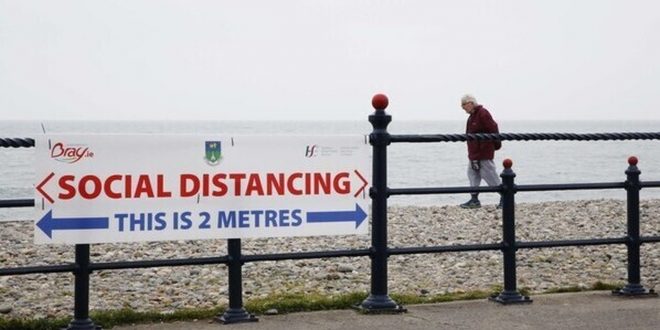With Ireland set to move to Phase 2 of the roadmap for easing Covid-19 restrictions on Monday, 8 June, Moira Hannon explores what the future might look like in Ireland.
Coronavirus has cost more than 1,600 lives, crashed the economy and had a huge societal impact – from shutting children out of schools to isolating over 70s from their family and friends.
But there is no doubt that the restrictions introduced have saved many lives and latest indicators show the virus has been suppressed in the community with the R (reproductive rate) reduced to between 0.4 and 0.7.
Professor Philip Nolan, Chair of the National Public Health Emergency Team Irish Epidemiological Modelling Advisory Group, said the easing of restrictions in Phase 1 has not negatively impacted the reproductive number.
But does this mean we are on course to move more quickly through the roadmap?
Taoiseach Leo Varadkar hinted at this when he told the Dáil that proposals have been made to NPHET and Chief Medical Officer Dr Tony Holohan to bring forward the lifting of some Covid-19 restrictions.
Such a possibility – to fast track part of the roadmap – will have been prompted by the latest data showing the virus is now claiming fewer lives with the number of cases also greatly reduced.
The Department of Health confirmed 41 Covid-19 related deaths and 382 new cases between Thursday 28 May and Thursday 4 June. Back in April, 337 people died in one week alone (16-23 April) and there were 4,020 new cases.
But to keep the virus suppressed means life might have to look very different in the coming months.
How do we compare?
Comparisons between Ireland and the rest of Europe show that restrictions are being eased here at a slower rate.
Oxford University’s Covid-19 Government Response Tracker examines lockdowns worldwide and rates them out of 100 (the higher the number, the stricter the response). The lower the score, the more ‘normality’ is returning to a country.
At present, Ireland is one of the countries with the toughest restrictions in the EU, at 77.78, stricter than Italy (60.19), UK (64.81), Belgium (75) and France (65.74) – all of which have recorded far more deaths than we have, albeit with larger populations.
Even in per capita death rates, Ireland (32.45 per 100,000) fares better than the UK (59.34) and Italy (55.48), according to Johns Hopkins University.
While these countries are reopening their economies at a faster rate, only time will tell what impact, if any, this has on their R numbers.
In the meantime, people in most of Europe, including Italy, Spain, Germany and France, can send their children to school, get their hair done, eat in a restaurant and enjoy a few drinks in their local pub.
Masks aren’t just for superheroes
Can wearing face coverings help us move more quickly through the road map for easing restrictions? Absolutely, according to Immunology Professor Luke O’Neill at Trinity College Dublin.
“If I was on NPHET, I would be strongly advising the Government to make masks mandatory,” he said. “They are another way to get rid of the virus. They are an extra weapon.
“Look at a car – it has seatbelts and an airbag to help prevent death or injury in an accident. So let’s use both masks and handwashing to help prevent the spread of the virus.”
Prof O’Neill advises the use of face coverings in supermarkets, on public transport and “anywhere indoors or outdoors where social distancing is not possible, such as in large crowds”.
He said that in the past two months the science around masks has got “stronger and stronger” and criticised public health advice in Ireland for being “slow to action”.
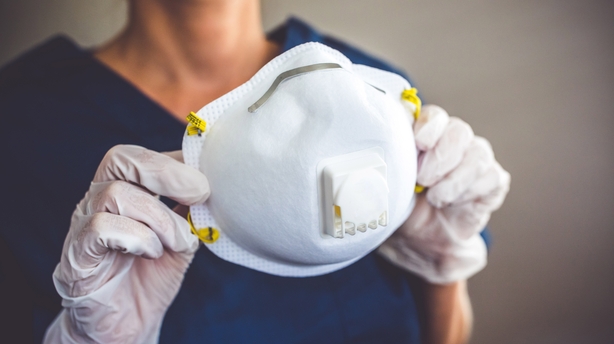
He added: “I understand [that NPHET] has to be cautious, and masks are not perfect in all circumstances, but there is a consensus that they do help limit the spread of Covid-19.”
Prof O’Neill says making face coverings mandatory means compliance would be far higher than it is now.
He praises Luxembourg for posting free masks to every household in the country. “Doing something similar here would also encourage people to wear face coverings.”
He is also in favour of bringing forward phases of the road map but only if the virus continues to be suppressed here. “Decisions have to be led by the data.”
Earlier this week, Minister for Health Simon Harris admitted there was “room for improvement” around the wearing of face coverings.
Local life: Shops and pubs
What will your local pub look like when it reopens (10 August if it remains in Phase 5 of the roadmap) – a question on many people’s lips right now.
The good news is that you will not be expected to wear a plastic face shield while supping a pint (as is the new normal in Japan).
The bad news is that your favourite pub is unlikely to reopen if the two-metre physical distancing guidance remains, according to Brian Foley from the Vintners’ Federation of Ireland.
“This is because it would reduce capacity by up to 87% of standing customers and 65% of those seated in a typical bar layout. So it would simply not be viable for many pubs to run a business.
“If we adopted the one-metre social distancing rule, more pubs would be able to operate.”
Protocols for the reopening of pubs have not yet been signed off by the Department of Health and are urgently needed, he warned.
“Many pubs that serve food will be open from 29 June, because they have restaurant licences. So we need clarity on operational guidelines as soon as possible.”

Is it true that customers will no longer be able to sit at the bar counter for a pint?
“Not true,” Mr Foley said. “There may have to be a plastic screen at the bar but you’ll be able to see through it and chat to the barman.
“I know it’s not ideal but we have already got used to it in supermarkets. And it could be the difference between being able to socialise down your local pub or not.”
Social distancing is also a problem for local shops.
Mark O’Neill, Chief Executive of the Irish Small and Medium Enterprises (ISME) group, said: “Reducing social distancing would make a significant difference to certain small outlets.
“Many will find it uneconomic to open under the two-metre rule. We feel it would be more sensible to advise businesses that two-metre social distancing requires protection measures a, b, and c, while one-metre social distance requires measures a, b, c, and d.”
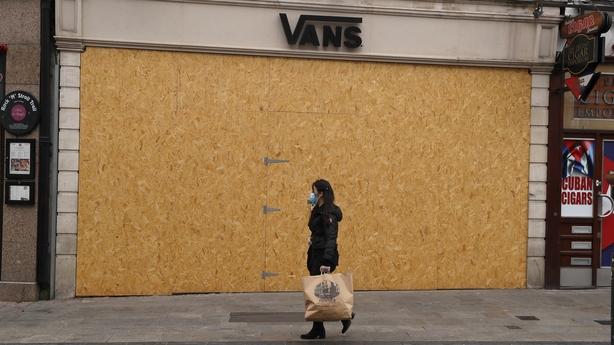
Mr O’Neill added that there will be “very significant costs in terms of cleaning, signage and personal protective equipment (PPE) for some businesses”. And he is looking for grants to be made available to help local businesses pay these additional bills.
Asked if smaller shops will struggle in a post-Covid economy, Mr O’Neill said it “depends on how quickly they can return to at least some significant proportion of previous trade”.
A recent survey by ISME among its members found that one in five (22%) had laid all of their staff off, while 6% of those still operating did not envisage being able to survive beyond one more month.
Invisible victims
While Covid-19 itself has cost many lives across Ireland, the pandemic has also impacted on the quality of life for vulnerable groups.
Chief Executive of the Irish Cancer Society Averil Power recently warned that “the recovery of cancer services must be tackled urgently to ensure that we do not see lives needlessly lost to cancer”.
Both BreastCheck and CervicalCheck have ceased operating due to safety concerns. This had led to fears that women who may have breast or cervical cancer are going undiagnosed.
In a typical month, 88 women have cancers detected through BreastCheck. No mammograms were carried out by BreastCheck in April, compared to 13,763 in the same month last year
Around 12,000 women a year (according to 2016-2017 report) are referred for a colposcopy after an abnormality is detected in CervicalCheck. But its labs received just 937 samples for analysis in April, compared to 21,037 in April 2019.
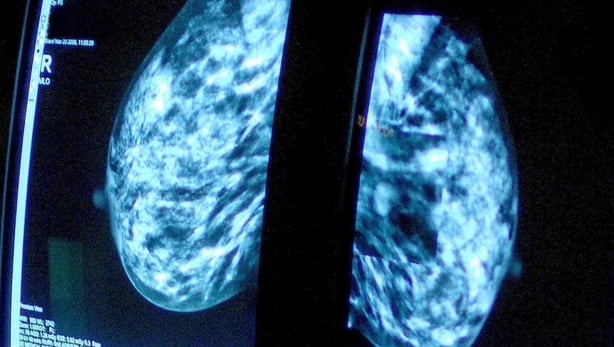
Minister for Health Simon Harris met the National Screening Service (NSS) this week.
In a statement afterwards, he said it had been a productive meeting and plans were being finalised by the NSS for the resumption of each of the cancer screening programmes “as soon as is practicable”.
The Covid-19 restrictions are also difficult for domestic violence victims. Safe Ireland co-CEO Mary McDermott said those affected are being forced to choose between the threat of infection and the threat of abuse.
Speaking on RTÉ’s Morning Ireland, Ms McDermott said the national helpline has seen an increase in calls since the Covid-19 restrictions were imposed, while there have been more presentations at refuges by single women, pregnant women, and women with children.
Women who are experiencing domestic violence can go to their local Boots pharmacy and access a ‘Safe Space’ in a consultation room.
Happy holidays?
The Irish Hotels’ Federation says most hotels are ready to welcome holidaymakers with open arms from 29 June, if the Government brings forward the current opening date of 20 July.
“Hotels have already begun to adapt their services and facilities in anticipation of reopening under Covid-19 guidelines,” a spokesman said.
But what can guests expect from a hotel stay this summer? The spokesman added: “While steam rooms and saunas may be closed for the foreseeable future, pools and gyms will be open with special booking arrangements.
“We expect that breakfast buffets and carveries will give way to table service and expanded room service. Although bars may not reopen until August, guests will be able to enjoy a drink with their meal.”
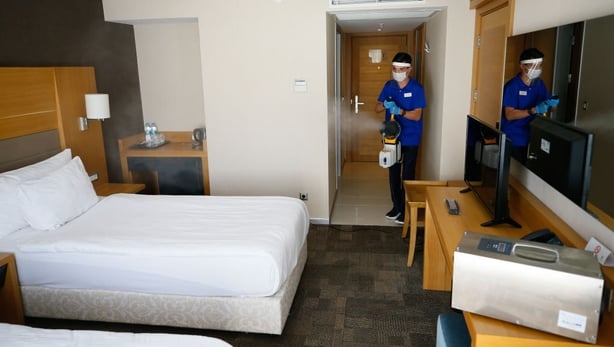
Fáilte Ireland said that operational guidelines for tourism and hospitality businesses will be published “in the near future”.
However, the two-metre social distancing guidance is not viable for many of these businesses, a source in the tourist organisation told RTÉ News.
“This needs to be addressed. We would also be hoping that hotels will be allowed to reopen on 29 June to save the summer.
“We know of hotels where July and August has already sold out, so the demand is there.”
The source said the 14-day quarantine period for all arrivals into Ireland was also “challenging” for the tourism sector.
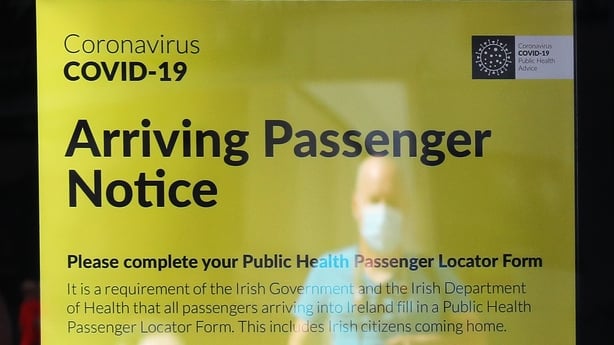
The Government is currently advising against all non-essential travel abroad but aviation journalist Eoghan Corry believes airlines have done enough to persuade people that flying will be safe when overseas trips resume.
Mr Corry said: “The air filtration system in planes is hospital theatre standard. Mask-wearing will also help to reassure people. The first person home with a suntan will encourage others.”
He says 15 June is D-Day when Europe opens its borders to tourists again, albeit with certain restrictions.
Ryanair will have 40% of its fleet back in the air from 1 July with “many other airlines also resuming flights from Dublin airport in July,” according to Mr Corry.
Chief Executive of the Irish Travel Agents’ Association Pat Dawson said travel agents are taking overseas bookings for July onwards. “If a vaccine arrives it will be a quick recovery, if not it will be at least 12 months,” he added.
Child’s play
As the long summer stretches out ahead, parents are wondering how they will keep children and teenagers entertained for the next three months.
The pandemic is also having a detrimental impact on the mental health of many young people. Jigsaw, the national centre for youth mental health, has reported a 400% increase in demand for its online services since the beginning of the coronavirus crisis in March.
“We’ve had a lot of contact from young people and their parents over the past couple of months,” a spokesman said.
“Some of the themes coming out are feelings of isolation, lack of contact with friends and family members, particularly grandparents, struggling with motivation and finding it hard to keep on top of school work.
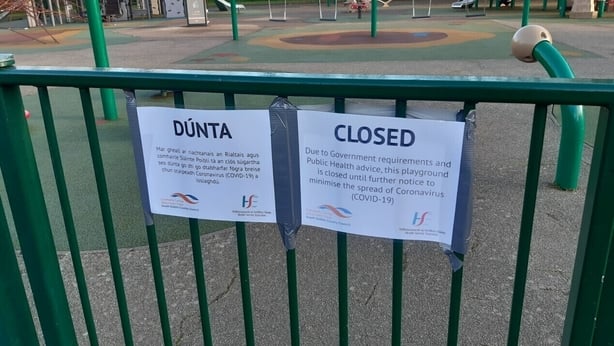
“The absence of sport has been felt by many young people who’ve been in touch with Jigsaw. Sports offer young people an opportunity to connect with friends and peers, is a great outlet and has a positive impact on their mental health.”
The good news for energetic children is that some summer camps will be running this summer. The GAA says its popular Cúl Camps are “expected to go ahead … subject to the latest available advice” while the Let’s Go nationwide activity camps are set to go ahead in late July and August with “a new programme of activities to allow for social distancing”.
Minister for Education Joe McHugh has vowed to bring proposals to Cabinet next week on the provision of a summer programme for children with special needs and those at risk of educational disadvantage.
What happens next?
There is no such thing as a “no risk” situation as we reopen Ireland – there will be more cases of Covid-19 in the community, so we need to take the right precautions, according to a source in the Health Service Executive.
She likened the virus to an iceberg – “we see the tip of it, but underneath, there is a lot more that we cannot see”.
She added: “Many people have no symptoms so that is why I think the three week intervals in the roadmap are about right, it gives us time to see what impact the easing of restrictions is having.
“Isolating yourself straight away if you have symptoms will be even more important as we move forward.”
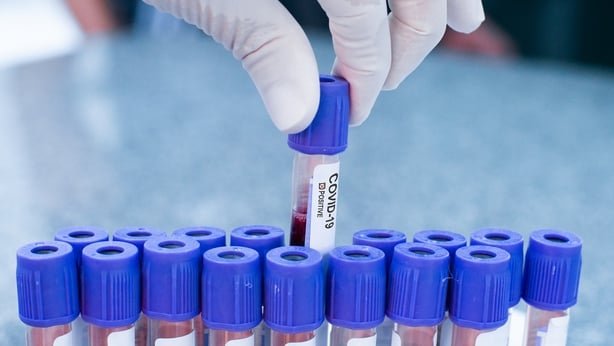
The big worry in the HSE is managing the virus in the winter, which is also flu season.
“If every person with a sniffle has to go home from work, in case they have Covid, that could have a big impact on businesses.
“You also have to consider how to manage social distancing so there won’t be long queues of people outside shops in the rain and cold weather.”
Meanwhile, Professor O’Neill is confident that a vaccine could be here sooner rather than later.
He said: “We are rightly very cautious when it comes to vaccines but four of the biggest pharma firms in the US are now working together.
“This means we can make progress at warp speed – they are like one giant Starship Enterprise confronting Covid.”
Read more:
At a glance: What restrictions are likely to be lifted and when?
Latest coronavirus stories
 The Argus Report Read about it!
The Argus Report Read about it!
